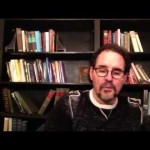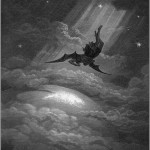We run our website the way we wished the whole internet worked: we provide high quality original content with no ads. We are funded solely by your direct support. Please consider supporting this project.
A Visit to Auschwitz
Ever since I first learned of the full horror of the Holocaust when I was a freshman at the University of Minnesota I have had a kind of obsessive fascination with it. I’ve studied every aspect of Hitler and the Third Reich and about the philosophy that led to their “Final Solution.” In fact, for several years, I taught a course at Bethel University entitled “Theology After Auschwitz.” To get on the inside of this unthinkable horror, I would have the class not only read books, but also watch films and hear from living survivors. My conviction has always been that, after the Crucifixion of the Son of God, the Holocaust represents the greatest expression of evil in human history. For this reason, I believe it ought to serve as a criterion by which we measure the authenticity of our theology, and especially of our thinking on the problem of evil. “If you cannot speak it standing next to the mass grave of gassed children,” I have often said, “it is inauthentic to ever speak it.” In my view, all the flowery statements about God controlling all things for his glory become hollow nonsense in the vicinity of gassed children.
In just a few weeks I have the opportunity of fulfilling a several decades long dream of visiting Auschwitz and Birkenau. It will take place at the end of several weeks of kingdom teaching in Austria and Switzerland. I’ll be accompanied and supported by my wife Shelley and my kingdom co-workers, Greg and Marcia Erickson. I believe the experience will be powerful as we reflect on theological matters with the above criterion in full view.
To make the most of this visit, I’m wondering if any of you have ever visited these memorials? If so, do you have any recommendations for us? For example, should we view these memorials with a tour guide? And if you think we should have a guided tour, is there one you can recommend? Please send any information you think would be helpful to marcia@reknew2015.wpengine.com.
Thanks so much for your help. If it comes to mind, please pray that in both my speaking ministry and in our memorial visits, God will accomplish in us and through us all that he intends.
Sincerely,
Greg Boyd
Category: General
Tags: Auschwitz, Blueprint Worldview, Calvinism, Europe, Theodicy, Warfare Worldview
Related Reading

Why God Sometimes “Can’t”
Greg continues his thoughts on sickness and spiritual warfare by addressing the question of why God “can’t” intervene in some circumstances of illness.

Why? The Question That Cannot Be Answered
Yesterday Greg sent out the following flurry of tweets: To provide some background to these tweets, the following illustration will prove helpful: They mystery of evil and an eight-second interval Let’s assume that there is an eight-second interval between two cars. Now let’s try to explain why there is this eight-second interval at this particular…

Free Will: Is it a coherent concept?
Greg is going to be spending the next several blogs talking about the idea of free will. In this first reflection, he discusses whether it is coherent to speak of a decision that is not determined or exhaustively caused.

The Open View and Radical Suffering
Jessica Kelley spoke at Open2013 this morning, sharing her journey with tenderness and authority. Jessica began wrestling with her view of God a couple of years ago and embraced Open Theism prior to the diagnosis and eventual death of her four-year-old son, Henry. Everyone here at the conference was profoundly affected by her story and…

Thou Shalt Not Fear Science-Part II
Yesterday I called your attention to Bev Mitchell’s essay in which he integrated science and theology as he reflected on power and love. This is part II of his essay and it’s on the limiting conditions of creation. It’s a fascinating speculative reflection on why God’s creation is the way it is and what our role is in…

That Weird Episode with the Pigs
In my opinion, the single strangest episode recounted in the Gospels is the account of Jesus’ encounter with a demonized man that ended with two thousand pigs drowning themselves in the Sea of Galilee (Mk 5:1-10//Mt 8:28-34; Lk 8:26-39). Some find it morally objectionable that this mass suicide was the result of Jesus allowing the…

